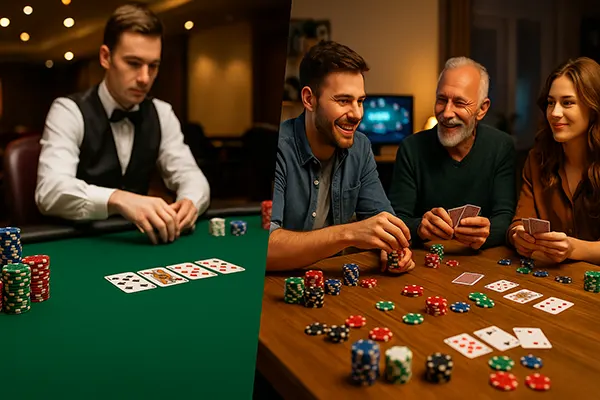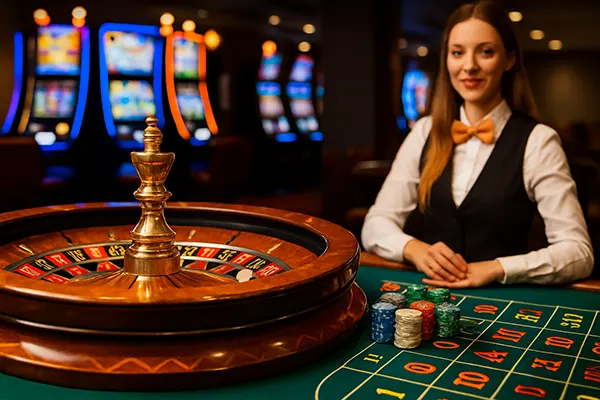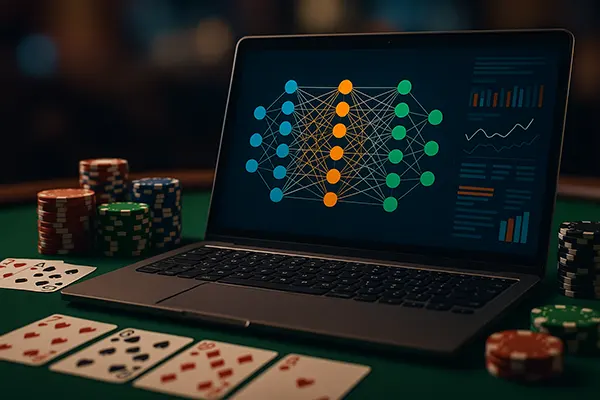
Poker in Casinos vs. Player-to-Player Poker: Key Differences and Advice
In the world of poker, players encounter two fundamentally different environments: casino poker and player-to-player (P2P) poker, often referred to as home games or online peer-based matches. While both formats share core rules and hand rankings, they differ significantly in structure, strategy, and financial dynamics. Understanding these distinctions can enhance your decision-making and improve your game, regardless of where you choose to play.
Understanding the Game Structure
In casino poker, players typically face the house or a dealer operating under fixed rules and time constraints. These games are highly regulated, offering a consistent environment with clear buy-ins, time-limited decisions, and predefined rake structures. Variants like Casino Hold’em or Three Card Poker dominate these tables, and the house always benefits from a mathematical edge.
By contrast, player-to-player poker—especially online or home games—fosters a dynamic setting where players compete solely against each other. There’s no house edge in the traditional sense, but the platform or organiser may take a small percentage as rake or service fee. Games can last much longer, with looser rule enforcement and variable player styles.
Most importantly, the flow and pace differ drastically. Casino tables tend to be fast and efficient, with dealers pushing the action forward. In P2P settings, especially in informal games, the rhythm is more relaxed, allowing for more conversation, bluffing, and nuanced psychological play.
Impact on Strategic Decisions
Casino poker demands quick, mechanical decisions. Since the opponent is usually the dealer, players often rely on mathematical probability and optimal hand selection. Bluffing is limited and generally ineffective in games against the house, so strategy leans towards maximising value from strong hands and minimising losses during weaker ones.
Player-to-player poker, however, thrives on adaptability and psychology. Reading opponents, interpreting betting patterns, and adjusting strategies mid-game are crucial skills. Bluffing becomes a powerful tool, especially when players are emotionally invested or unfamiliar with game theory optimal (GTO) concepts.
Moreover, experienced players exploit tendencies and behaviour over extended sessions. Knowing how to shift gears and conceal patterns is vital for long-term success in peer-based poker games.
Differences in Financial Implications
In casinos, financial risks are typically more transparent. Tables list clear minimum and maximum buy-ins, and the casino regulates betting limits to ensure smooth operation. Additionally, casinos operate within strict legal frameworks, offering players a degree of financial and operational security.
However, casino poker is almost always less profitable in the long term due to the consistent house edge. Even when players win, the margin is reduced by rake, time constraints, and table turnover rates. Professional players often avoid casino-based poker for this reason, unless they are exploiting comps or specific short-term advantages.
P2P poker, while potentially more profitable, also carries more financial volatility. Unregulated or informal settings might involve large swings, unreliable payment agreements, or risk of unfair play. Nevertheless, skilled players often find better long-term return on investment due to the absence of a fixed house edge and the presence of weaker opponents.
Managing Risk and Bankroll
In either setting, responsible bankroll management is essential. Casino environments demand discipline due to the constant temptation to rebuy or increase stakes under pressure. It’s easy to lose track of spending amidst a lively atmosphere and fixed table timings.
In P2P games, players must be wary of emotional tilt and streaks, especially during long sessions. Without external controls, it’s up to the player to track results, set limits, and avoid chasing losses. Maintaining records and reviewing hand histories is particularly useful in this context.
Whether facing the house or other players, setting clear win/loss limits before each session and sticking to them is one of the most effective ways to manage risk and protect capital.

Social and Psychological Dynamics
Casino poker is often a solitary experience. Players are seated side-by-side but rarely interact beyond brief table chatter. The atmosphere is formal, often quiet, and focused entirely on game mechanics. Croupiers ensure strict adherence to rules and etiquette.
In contrast, player-to-player poker—especially home games—can be deeply social. Banter, drinks, and shared history among players influence both the mood and the decisions made at the table. While this adds enjoyment, it also introduces distractions and emotional complexity that can cloud judgment.
Online P2P poker falls somewhere in between. While faceless and remote, it offers chat functions and avatars, simulating social elements. Players often join communities and forums to discuss strategies or share session results, fostering a network of learning and support.
Emotional Control and Focus
Playing against a dealer typically removes the emotional volatility of human opponents. Casino poker involves fewer variables related to behaviour, which can help beginners focus on card values, pot odds, and bet sizing. However, the fast pace may lead to impulsive decisions if a player is unprepared.
Conversely, peer-based games are emotional by nature. Winning against a friend or losing to a boastful rival can trigger impulsive actions. Learning to remain calm, detached, and disciplined is a defining trait of successful player-to-player competitors.
Ultimately, the ability to separate emotions from strategy plays a significant role in consistent results. Many players invest in mindset coaching or meditation techniques to improve their psychological resilience over time.




